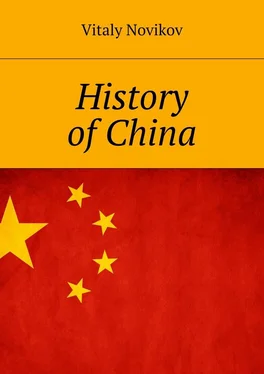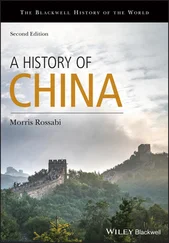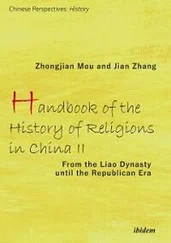Vitaly Novikov - History of China
Здесь есть возможность читать онлайн «Vitaly Novikov - History of China» — ознакомительный отрывок электронной книги совершенно бесплатно, а после прочтения отрывка купить полную версию. В некоторых случаях можно слушать аудио, скачать через торрент в формате fb2 и присутствует краткое содержание. ISBN: , Жанр: История, Прочая научная литература, Политика, на английском языке. Описание произведения, (предисловие) а так же отзывы посетителей доступны на портале библиотеки ЛибКат.
- Название:History of China
- Автор:
- Жанр:
- Год:неизвестен
- ISBN:9785448503313
- Рейтинг книги:3 / 5. Голосов: 1
-
Избранное:Добавить в избранное
- Отзывы:
-
Ваша оценка:
- 60
- 1
- 2
- 3
- 4
- 5
History of China: краткое содержание, описание и аннотация
Предлагаем к чтению аннотацию, описание, краткое содержание или предисловие (зависит от того, что написал сам автор книги «History of China»). Если вы не нашли необходимую информацию о книге — напишите в комментариях, мы постараемся отыскать её.
History of China — читать онлайн ознакомительный отрывок
Ниже представлен текст книги, разбитый по страницам. Система сохранения места последней прочитанной страницы, позволяет с удобством читать онлайн бесплатно книгу «History of China», без необходимости каждый раз заново искать на чём Вы остановились. Поставьте закладку, и сможете в любой момент перейти на страницу, на которой закончили чтение.
Интервал:
Закладка:
History of China
Vitaly Novikov
© Vitaly Novikov, 2018
ISBN 978-5-4485-0331-3
Created with Ridero smart publishing system
Shang
People have inhabited the territory of modern China in the Stone Age. Archaeologists have found traces of their activity. The earliest finds date back to the third millennium BC. The ancient Chinese had a matriarchy, as the other ancient peoples. The kin was conducted by a father, but not a mother. Gradually the power passed into the tribes to men to the leaders. The leader of a tribe ruled together with the council of elders.
In the 18th century BC, the tribe Shang won Xia tribe. Shang created own state. Their political center was located in present-day Henan province. Shang is sometimes naming Yin. The social system of the Shang was the slave. In this state, the production of tools and weapons made of copper and bronze was established. Animal husbandry and agriculture were distributed. The millet was the most popular culture. At this time the moth has already bred for the production of silk. Mulberry trees were grown. In everyday life and for the war elephants were used, which brought the dependent tribes. A manufacture of various products has increased and therefore began to establish the exchange of goods. The measure of value was the cowrie shell, and when it did not have its analogues made of jade and other materials.
The Emperor ruled by King – Wang. Wang is about the governor. Hieroglyph Wang consists of two elements: a great and unique. Wang called the son of the sky, that is, his power in the ideological sense, had a divine origin. Wang was the nominal landlord of all the lands of the state, the high priest and the chief rolled into one. The slave-owning aristocracy was a step below in the hierarchy. These were the sons, relatives and subordinates of the king. Warlords called Hou. Bo literally means uncle. Bo used to be the rulers of areas. Zi also ruled areas. Zi is the king’s son. A broad layer of free people is represented mainly by farmers-commoners. These people are called Min – people or Xiaomin – small people. Slaves were the lower strata of society powerless they traded for things, sold, and sometimes sacrificed to the gods as well as livestock. The Shang had the army and prisons. The criminals were subjected to different executions: burning at the stake, hanging, quartering, beheading, burying alive in the earth. There were other punishments: cutting off the nose and ears, eye gouging, cutting off the hands and feet. Hieroglyphics suggest that people kept in the stocks, cells and pits – it was a species of a prison.
Shang kings subjugated neighboring tribes and their lands attached to their country. Other tribes became dependent from Shang kings. These tribes were paying tribute. The leaders of these tribes received various titles and honors from Shang kings. In this kind of dependence were tribes – Sian, Shoo, Chou. A lot of trouble brought Shang State nomadic tribes living in the north of its borders. Shang often fought with them. State Shang was destroyed Zhou tribe, when the leader of this tribe U Wang has defeated the army Shang ruled Shaw (Di) Xin in the Battle near Moe. A betrayal and a desertion to the enemy of the few Shang commanders contributed to the Zhou victory. The last ruler of the Shang Shou (Di) Xin rules from 1154 by 1122 BC (dates tentative, the exact dates are considered only from the 9th century BC).
Western Zhou
Western Zhou Civilization existed from the 12th to the 8th century BC. The center of this state was in what is now Shaanxi province. Western Zhou occupied a vast territory. It was divided into regions and principalities, the rulers of which must be during special ceremonies bring gifts to Wang. These ceremonies had a great importance. Abnormal behavior and non-compliance during this ceremony is considered an insult.
As in Shang, in the Western Zhou flourished slavery. Slaves had no rights and often die quickly. Needing in new slaves, Wang made military campaigns and made from prisoners of war the new slaves. Criminals have become slaves. Criminals also became slaves. The legislation had prohibited the use of wine and hunting, marriage between relatives. Everyone was obliged to respect their parents. Five types of penalties were introduced for the 3000 crimes. Mosin – ink stamp on the face for 1000 crimes, yixing – nose cutting for 1000 crimes, feysin – leg amputation for 500 crimes, goonshin – castration for men, for women turning into slaves-hermits for 300 crimes, dapisin – cutting off the head of 200 crimes.
Ancestor worship has continued to develop in religion. Ancestor worship has continued to develop in religion. Deaths representatives of the ruling dynasty worshiped first. The priests and diviners controlled religion. The victims were brought to the memory of the deceased Wangs. Human sacrifice was abolished, replaced by a straw man. Also pets used as victims in small quantities.
A son of the last Shang ruler U Geng has saved lives. U Geng can provisionally to rule in his country. Shang was divided into three parts. The ruler of Zhou sat in every part. U Geng rebelled against Zhou, but he was defeated. U Geng was killed. All Shang aristocracy was in captivity. Two towns built for them far from the Shang. They settled there, as ordinary people.
Eastern Zhou
Yu Wang heir Yu Wang Pin Wang with his aristocracy fled то the East and settled in the town of LOI. Pin van rules from 770 to 720 BC Since his reign began the civilization of the Eastern Zhou.
At that time the growth of the productive forced associated with the spread of making different tools and weapons from iron. Metal money appeared.
The trade was developing. A class of merchants had increased. They begin to play a significant role in a society. The lands, belonged to the genera, belong to families now. Often the lands pass into the possession of the new slave-owning: aristocracy, dignitaries, military commanders, merchants. The land is sold.
The period of the Eastern Zhou was very restless because of the constant wars. The United State did not exist. The power concentrated in the hands of influential families, who passed their positions by inheritance. The country was divided into large kingdoms, medium and small principalities. The most powerful were five kingdoms of Qin, Jin, Qi, Chu and Song. They are called in China U BA – five hegemons or five despots. Chu was located in the middle reaches of the river Yangtze. The Chu capital was a city Ying (modern Hubei province). In 7—6 centuries BC it was the largest Chinese Empire. Qi was located in the Eastern part of the Eastern Zhou. The capital of Qi was the city of Lintz (modern Shandong province). Sometime Qi was the richest among the other Chinese States. Often Qi and Chu fought with each other. In the West of the Eastern Zhou was the Kingdom of Qin. Qin fought with the nomadic tribes. Qin formed an alliance with the Kingdom of Jin. The capital of Jin was Jiang (modern Shanxi province). Jin hegemony was from 632 in 546 BC. In the South-East of the Eastern Zhou located in the Kingdom of Wu with its capital Wu (present-day Jiangsu province). Wu have intensified during the reign of Show-man. A hundred years Wu had fought against Chu. Ten years Wu had been kept under his rule the capital of Chu Ying.
Family. Astronomy. Medicine
In Ancient China was polygamy. The rulers had legitimate wives and concubines. Their power was inherited by the eldest sons of the lawful wives.
The Chinese studied the stars and had knowledge of astronomy. They target certain key dates of the stars and constellations. These calculations were carried out, starting from the observation position in the sky: a star Daha (Antares), constellation Tsan (Orion), Bae Doo (and the bucket) – the Big dipper.
Читать дальшеИнтервал:
Закладка:
Похожие книги на «History of China»
Представляем Вашему вниманию похожие книги на «History of China» списком для выбора. Мы отобрали схожую по названию и смыслу литературу в надежде предоставить читателям больше вариантов отыскать новые, интересные, ещё непрочитанные произведения.
Обсуждение, отзывы о книге «History of China» и просто собственные мнения читателей. Оставьте ваши комментарии, напишите, что Вы думаете о произведении, его смысле или главных героях. Укажите что конкретно понравилось, а что нет, и почему Вы так считаете.












